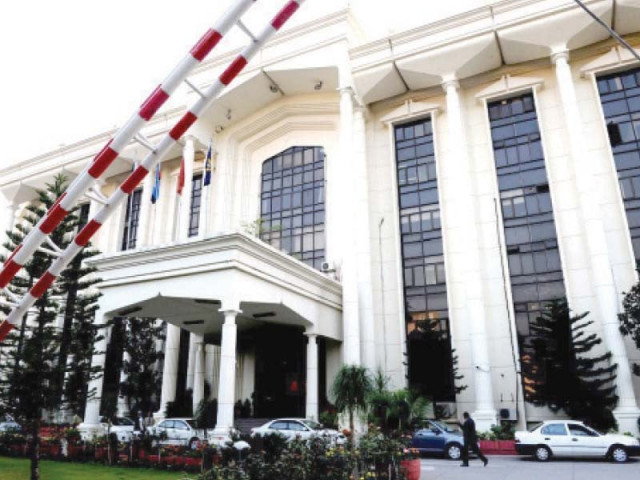FBR crosses Rs6.1tr tax target
Meets goal for first time in recent history as receipts rise 29% from previous year

The Federal Board of Revenue (FBR) has, for the first time in recent history, surpassed the annual tax collection target of Rs6.1 trillion on the back of higher imports, as Finance Minister Miftah Ismail vowed to reward the taxmen by ending disparity in their salaries.
The FBR provisionally collected around Rs6.125 trillion till Thursday evening, beating expectations of the finance ministry that had made new fiscal year 2022-23 budget on the estimate of Rs6 trillion collection.
The tax collection in fiscal year 2021-22 was about 29%, or Rs1.38 trillion, higher than the preceding year.
For FY22 that ended on Thursday, the National Assembly had approved a tax target of Rs5.829 trillion that in January this year was revised upwards after the previous government slapped Rs360 billion worth of new taxes in the mini-budget.
Sources told The Express Tribune that the Ministry of Finance had asked the FBR to close the fiscal year with a collection of Rs6.050 trillion, and also directed to clear the pending reconciled refund claims.
On the request of the FBR, the State Bank of Pakistan (SBP) kept the designated bank branches open till midnight but the FBR surpassed the Rs6.1 trillion target at around 6.00 pm. It prompted the FBR to release more refunds after the collection jumped to Rs6.125 trillion.
The tax department had missed at least six monthly targets during the past fiscal year but ended up achieving the upward revised annual target for the first time in recent history.
The achievement of the tax target triggered a race between the PML-N and the PTI to take credit.
“I have given more tax refunds than Shaukat Tarin and also showed more growth in revenue collection during the last quarter (April-June) of the fiscal year,” said Finance Minister Miftah Ismail.
Read FBR employees end strike on finance minister’s assurance
“The higher collection and more payment of refunds tells where the competence lies,” said Ismail. The PML-N led coalition government had come in power during the second week of April.
Out of the Rs6.12 trillion collection, the FBR pooled Rs1.74 trillion or 28.4% of the total collection in the last quarter. It also paid Rs105 billion refunds in the fourth quarter, which was nearly one-third of the total Rs335 billion refunds paid in the just ended fiscal year, according to the Finance Minister.
During the last fiscal year, the FBR had paid Rs251 billion in tax refunds.
But there is resentment in the over 20,000 strong FBR workforce about disparity in its salaries compared with other government departments. Former military dictator General retired Pervez Musharraf had awarded the FBR 100% additional salary to encourage the workforce to collect more taxes and minimize corruption.
However, in 2015, the then PML-N government froze the additional allowance, which has now reduced the additional salary to just 20% of the basic pay. Rubbing salt to the wounds, the government gave 150% executive allowance on June 10th to the federal Secretariat employees but excluded the FBR.
Terming it the only major earning hand of the federal government, the FBR employees went on strike and also sent a summary to the Finance Minister, demanding 100% increase for low-pay scale employees and 150% for the grade 17 to 22 officers.
The FBR got Rs36 billion to meet all its expenditures for the new fiscal year, which is mere 0.48% of the next fiscal year’s target, said a senior FBR official. He said that ending discrimination in salaries would require Rs8.1 billion annual budget, which is just 0.1% of the new fiscal year target but will help to boost the morale of the tax machinery. The FBR’s demand is justified and I will end discrepancy in their salaries, said Finance Minister Miftah Ismail after visiting the FBR Headquarter on Thursday evening.
For the new fiscal year, the government has set the tax collection target at Rs7.470 trillion on the IMF’s demand, which will require about 22% growth in collection. The target seems achievable given the high inflation rate.
In the just ended fiscal year, the FBR’s performance remained largely dependent on imports that contributed 51% to the total tax collection, which throughout the fiscal year camouflaged the weaknesses in the domestic sales tax collection that remained negative.
Out of Rs6.12 trillion, the FBR collected Rs3.12 trillion at the import stage on account of withholding taxes, sales tax at imports and the custom duties.
Overall, the FBR collected slightly over 63%, or Rs3.86 trillion, in regressive taxes – general sales tax, customs duty and federal excise duty, which were the three main sources of indirect taxes. The customs duty collection increased to Rs1 trillion, showing an increase of Rs245 billion, or 33%.
The FBR also recorded 27% growth in sales tax collection due to heavy reliance on import taxes. It collected over Rs2.5 trillion in sales tax, up Rs540 billion.
The total increase in sales tax collection remained lower than the surge in sales tax receipts at the import stage due to the negative growth in domestic sales tax collection.
The FBR collected around Rs712 billion in domestic sales tax compared with Rs824 billion in the previous year, a reduction of around 14%, which should be a serious concern for the government.
The constant negative growth in domestic sales tax has challenged the traditional theory that revenue collection should increase proportionately to the nominal GDP growth rate.
Contrary to that, the sales tax collection at the import stage stood at Rs1.81 trillion against Rs1.15 trillion in the previous year. There was an increase of over Rs660 billion or 57% in sales tax collection at the import stage.



















COMMENTS
Comments are moderated and generally will be posted if they are on-topic and not abusive.
For more information, please see our Comments FAQ